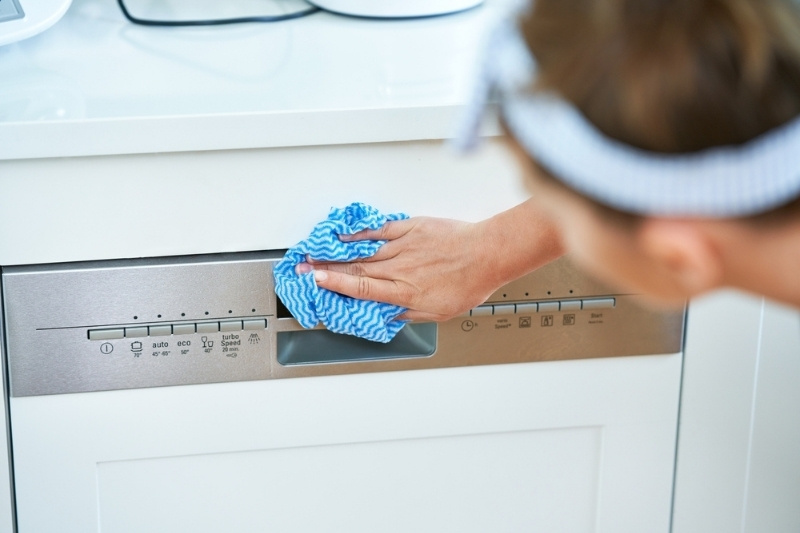Dishwashers are commonplace in many UK homes, freeing up time and taking the dreaded task of doing the dishes off our hands.
However, you need to look after your dishwasher for it to perform optimally with each wash.
Without a little TLC, your dishwasher will soon harbour germs and food. You’ll be left with half-clean dishes, murky glasses, and a half-done job.
If you fail to look after your dishwasher long enough, the entire appliance might pack in. This won’t only mean you’re back doing the dishes by hand but can also end up you needing a costly new dishwasher.
If you’re unsure how often you’re supposed to clean your dishwasher and how to go about standard dishwasher maintenance, you’re in the right place.
Here we run through all your dishwasher-cleaning must-knows, so your dishwasher keeps on washing dishes as it should!
How Often Should You Clean Inside Your Dishwasher?
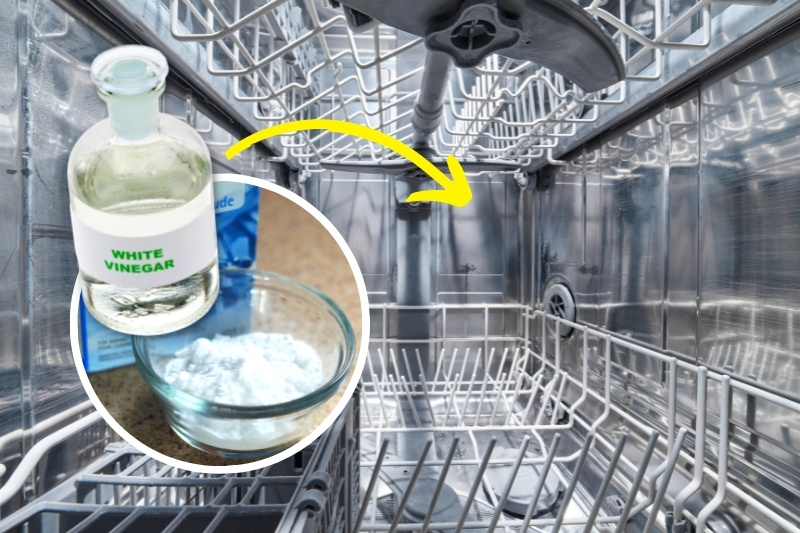
Dishwasher interiors should be cleaned every one to three months, depending on how much you use the appliance.
This is excellent news. If you only lightly use your dishwasher, you only need to clean it a maximum of four times per year.
This is extremely doable and can easily be added to your cleaning schedule to ensure you don’t forget.
If you want to know how to clean a dishwasher, read our complete dishwasher cleaning guide. Here are the basic steps taken from this guide you need to follow:
- Step 1: Make sure the dishwasher is empty – Start by emptying your dishwasher completely. This includes all dishes and cookware, but also pieces of food and other debris you can see.
- Step 2: Add white vinegar – Take two bowls filled with white vinegar and place them inside your dishwasher, one on each rack. Run your dishwasher on a hot cycle to remove stains, germs, and other debris.
- Step 3: Sprink bicarbonate of soda – When the cycle has ended, sprinkle a little bicarbonate of soda (or baking soda if you’re in the US) into the base of the dishwasher. Run the appliance on another hot cycle to deodorise the machine.
If you’d rather not use everyday household products like bicarbonate of soda and white vinegar, you can alternatively purchase dishwasher cleaners. These are some of the best cleaning products that declog your dishwasher, remove stains, and leave it smelling fresh.
How Often Should You Clean Your Dishwasher Filter?
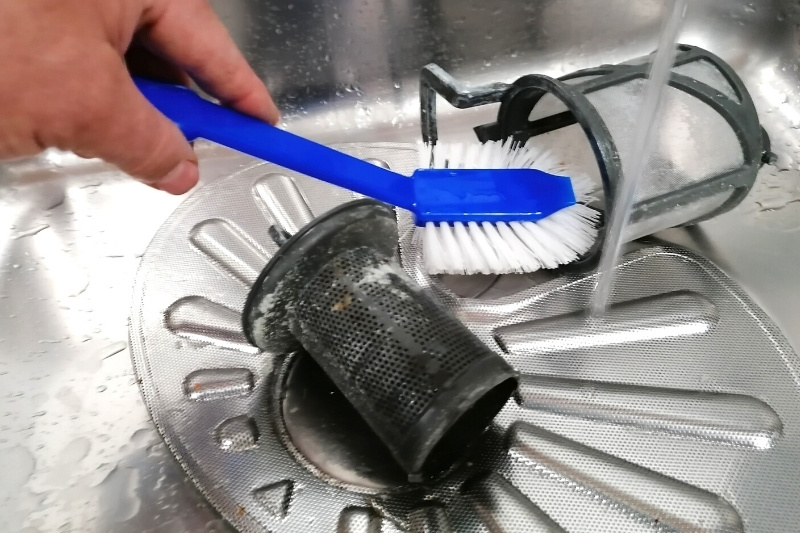
Your dishwasher filter needs to be cleaned more regularly than the interior of your appliance. The filter catches all food and debris from your dishes.
If this isn’t cleaned and these food pieces removed, dirty water gets trapped, and germs start accumulating! This leads to a nasty dishwasher smell and unsanitary conditions.
Older machines may have self-cleaning filters, which rarely need your attention. On the other hand, newer dishwashers have manual filters that are quieter but do require more maintenance. Generally, you should aim to clean manual dishwasher filters at least once per month.
Thankfully, the process is quick and easy, only requiring supplies you likely already have in your home. Here are the steps to follow:
- Step 1: Locate filter – Dishwasher filters are usually in the base of the dishwasher. Try and locate your manual filter, referring to the instruction manual if required.
- Step 2: Remove the filter – Once you’ve located the filter, remove it from the machine. Most manual filters twist out and have arrows pointing in the direction it needs to turn. Unlock the filter and remove it from the dishwasher.
- Step 3: Wash using washing up liquid – Fill your sink with warm water and add washing up liquid. Put the filter in the water and leave it to soak for a few minutes. Once the debris has loosened, scrub the filter with a toothbrush and rinse with hot water.
- Step 4: Wipe filter housing – Take a sponge soaked in the hot, soapy water and clean the opening in the dishwasher where the filter sits. This removes any excess food particles.
- Step 5: Repace the filter – Take your clean dishwasher filter and place it back inside your machine. Be sure to lock it securely in place as per your dishwasher’s instruction manual.
On top of this more extensive monthly cleaning routine, you should try and prevent debris from clogging up your filter in the first place.
The best way to do this is to scrape and rinse the plates before putting them in your dishwasher.
You can also quickly check the base at the end of each cycle. If you see any food bits accumulating, wipe these away.
How Often Should You Clean Your Dishwasher Exterior?
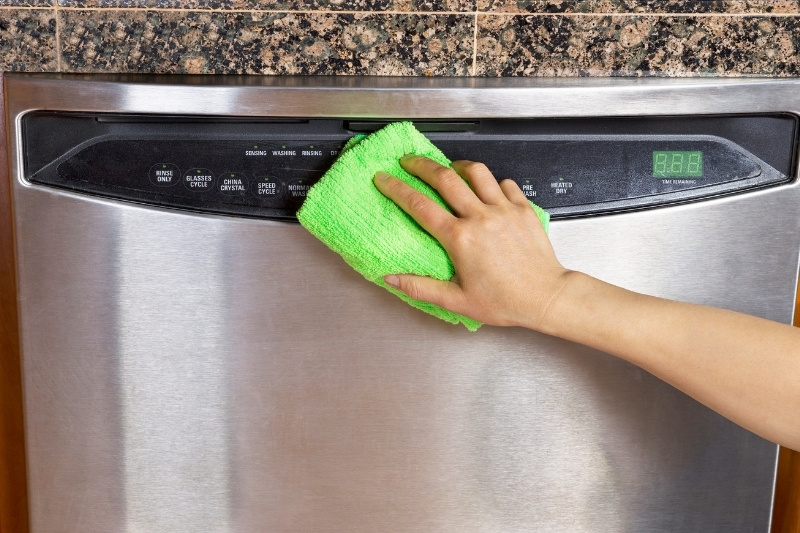
With a clean interior and filter, you mustn’t forget about your dishwasher exterior.
A dirty exterior won’t impact your appliance’s ability to clean dishes successfully. However, this is the part on display, and you’ll want to keep it looking clean and tidy.
There is no set frequency you should clean the outside of your dishwasher, but we recommend adding this to your weekly cleaning to-do list.
Use hot, soapy water and a sponge to wipe away all food splashes, debris, and stains. A
lternatively, a standard kitchen cleaner can be used, or whatever you use to clean your cupboards for integrated appliances.
6 Signs Your Dishwasher Needs Cleaning Now!
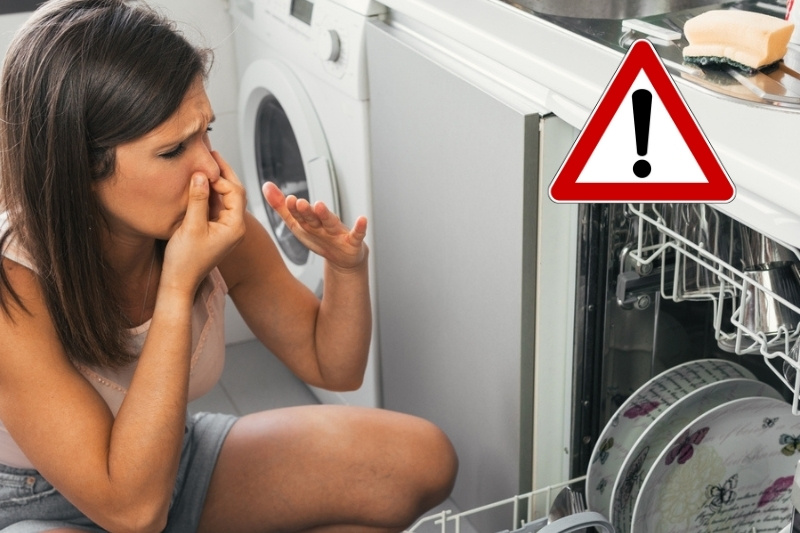
Cleaning your dishwasher should be done regularly. You should wipe down the exterior of your appliance every week, clean your dishwasher filter every month, and deep clean your dishwasher interior at least every three months.
Doing this should increase your dishwasher’s lifespan and leave your plates and glasses gleaming!
However, this is just a general rule of thumb. How often you need to clean your dishwasher depends on how much you use it.
Other factors, such as whether or not you regularly fill your dishwasher salt reservoir and whether you rinse plates before loading them into the racks, also come into play.
If you’re unsure whether or not your dishwasher needs cleaning, here are six signs that indicate a full deep clean might be necessary:
- An unpleasant smell coming from the appliance
- Visible food buildup in the base of the dishwasher or its filter
- Food debris lodged within the sprayer arm
- Unclean or greasy dishes at the end of the cycle
- The machine is getting clogged, and water is unable to drain
- Rusting on the metal inside the machine
If you notice any of these signs, don’t wait until your dishwasher is due a clean. Get your cleaning supplies ready and show your dishwasher a little care.

Hannah has a passion for cleaning. She worked her way around Australia by cleaning hostels in exchange for free accommodation and used her cleaning skills to bag a job as a chalet host for a luxury ski company in France.
